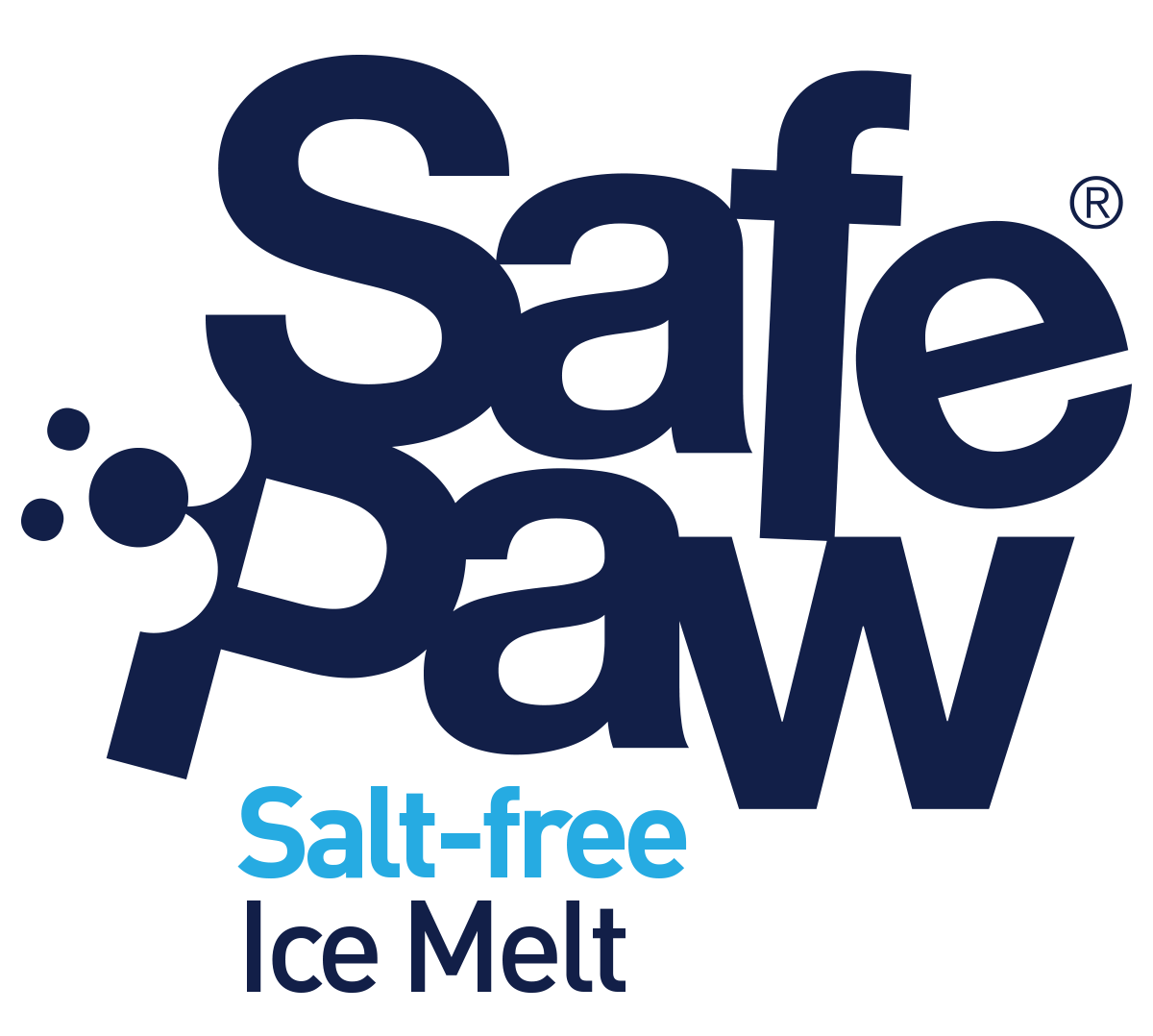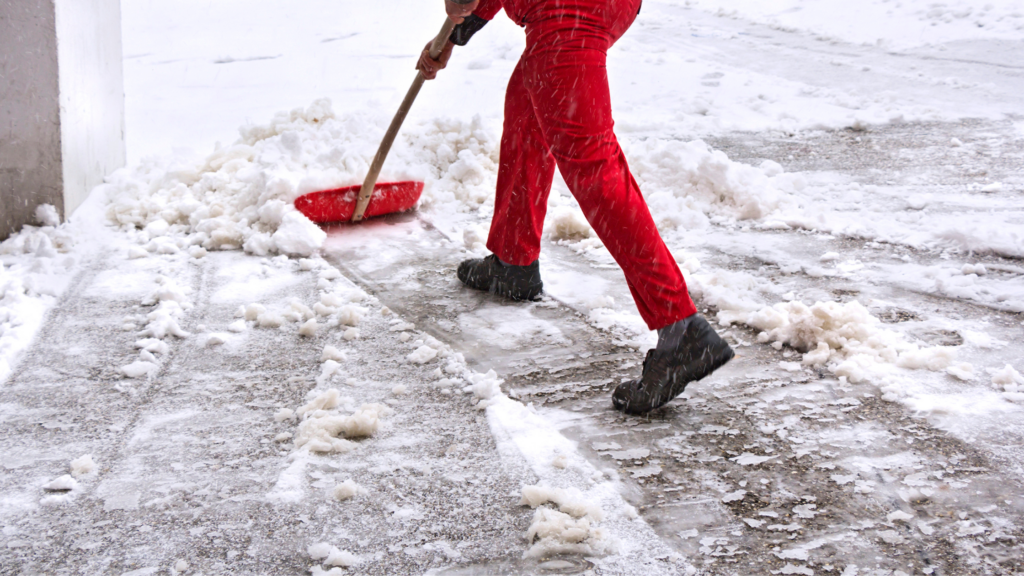
When winter strikes with its icy grip, the choice of ice melt becomes crucial. In the arena of deicing agents, two contenders often come up: magnesium chloride ice melt and calcium chloride ice melt. Both have their strengths and weaknesses in battling ice and snow. This article offers a detailed comparison between the two, highlighting their characteristics and why a chloride-free alternative like Safe Paw might be a better choice.
Table of Contents
Magnesium Chloride Ice Melt: The Low-Temperature Champion
Magnesium chloride ice melt is known for its effectiveness in lower temperatures. Here’s a closer look at its features:
- Melting Capability: It’s effective at temperatures as low as -13°F. This makes magnesium chloride ice melt a reliable option in colder climates.
- Environmental and Surface Impact: While less corrosive than calcium chloride, magnesium chloride still poses some risks. It can cause damage to concrete over time and may harm nearby vegetation.
- Pet and Human Safety: It is generally safer than calcium chloride but can still cause discomfort or harm if pets ingest it or walk on it.
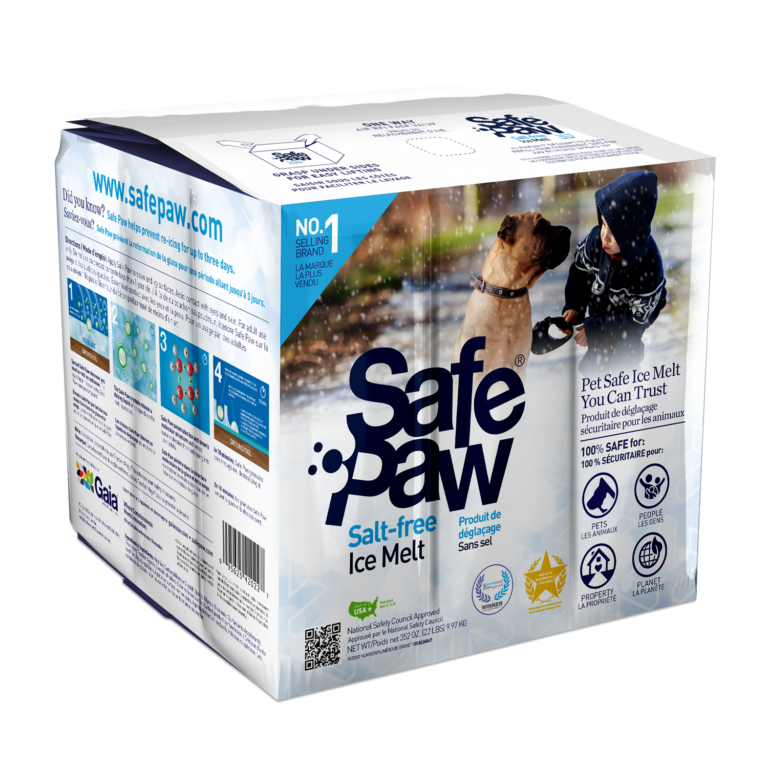
Safe Paw
It is a pet-friendly, eco-friendly ice melt that is safe for your family, pets, and property. It is made with a unique formula that is gentle on paws and concrete, and it melts ice and snow quickly and effectively.
Safe Paw is the perfect choice for winter weather!
Calcium Chloride Ice Melt: The Fast-Acting Powerhouse
Calcium chloride ice melt is a heavy-duty option known for its rapid ice-melting ability. Its key attributes include:
- Efficiency in Extreme Cold: Calcium chloride can melt ice in temperatures as low as -25°F, making it one of the most effective deicers available.
- Speed of Action: It quickly absorbs moisture from the environment, creating a heat-generating reaction that rapidly melts ice.
- Impact on Surfaces and Environment: Similar to magnesium chloride, calcium chloride can be corrosive to concrete and harmful to the surrounding ecosystem.
Get ready for winter with Safe Paw: The Pet-Friendly Ice Melter that cares – for your home, pets, and planet.
Comparing the Two
In the showdown between magnesium chloride and calcium chloride, the choice often boils down to specific needs:
- Temperature Range: For extremely low temperatures, calcium chloride might be more effective.
- Speed of Melting: Calcium chloride typically works faster than magnesium chloride.
- Environmental and Surface Safety: Both can be harmful to surfaces and the environment, but magnesium chloride is generally less corrosive
Get ready for winter with Safe Paw: The Pet-Friendly Ice Melter that cares – for your home, pets, and planet.
The Drawbacks of Salt and Chloride-Based Ice Melts
Despite their effectiveness, both magnesium chloride and calcium chloride have significant downsides:
- Corrosiveness: They can damage concrete and metal surfaces, leading to costly repairs.
- Environmental Concerns: These chlorides can harm plants, contaminate water sources, and disrupt ecosystems.
- Risk to Pets and Humans: If ingested or if they come into contact with skin or paws, these substances can be harmful.
Safe Paw: A Safer and Effective Alternative
Considering the negatives associated with both magnesium chloride and calcium chloride ice melts, Safe Paw emerges as a superior alternative:
- Chloride-Free and Non-Toxic: Safe Paw is free from harmful chlorides, making it safe for pets, people, and the environment.
- Effective in Cold Temperatures: It can effectively melt ice at temperatures as low as -2°F.
- Non-Corrosive: Unlike traditional ice melts, Safe Paw does not damage concrete or metal surfaces.
- Eco-Friendly: It’s environmentally friendly, ensuring your deicing practices do not harm the surrounding ecosystem.
- Long Shelf Life and Efficient Usage: Safe Paw’s granular form ensures it lasts longer and covers more area, making it cost-effective.
Get ready for winter with Safe Paw: The Pet-Friendly Ice Melter that cares – for your home, pets, and planet.
Magnesium Chloride Cost: The Hidden Price Behind the Bag
When winter storms hit, many people grab whatever ice melt they can find on the shelves. But if you’ve ever paused to check the price tag, you’ve likely noticed that magnesium chloride cost runs higher than traditional rock salt. A 50-lb bag often sells for $20–25, depending on where you live. At first, that may feel like a manageable expense—until you factor in how often it needs to be reapplied and what happens after the snow melts.
The cost of magnesium chloride isn’t just about the bag you buy; it’s also about the hidden repairs and replacements that show up later. Driveway cracks from repeated freeze-thaw cycles, corroded metal on your car, dead patches of grass, and even vet bills from paw irritation can turn a winter’s worth of deicing into a surprisingly expensive problem. What looked like a $20 solution in December may add up to hundreds of dollars in hidden costs by spring.
That’s the part many homeowners overlook: it’s not just what you pay upfront, but what you’ll continue paying for years after using chloride-based products.
Magnesium Chloride Salt For Driveway: A Convenient But Risky Choice
It’s easy to see why people turn to magnesium chloride salt for driveway care. It spreads easily, melts quickly in low temperatures, and feels like a step up from older methods. But convenience comes with trade-offs. Concrete surfaces, especially those less than a year old, are highly vulnerable to chloride damage. Over time, the surface scaling and cracking from repeated exposure can shorten the lifespan of your driveway dramatically.
Then there’s what happens when it gets tracked inside. Residue from magnesium chloride sticks to shoes, tires, and pets’ paws. Once indoors, it can affect flooring, air quality, and even skin if children crawl or play on contaminated surfaces. For pet owners, the bigger worry is irritation or stomach issues when pets lick their paws after walking on treated areas.
So while the salt may seem like an easy way to keep ice at bay, it’s worth asking: is a little short-term convenience worth the long-term headache?
Magnesium Chloride Ice Melt Canada: Widespread But Problematic
If you’ve shopped for magnesium chloride ice melt Canada, you’ve probably noticed it’s widely available in hardware stores and online. Canadian winters are brutal, and magnesium chloride’s ability to perform in extreme cold makes it appealing. But popularity doesn’t always equal safety.
The runoff problem is one of the biggest concerns. As snow and ice treated with magnesium chloride melt, the chloride seeps into storm drains, rivers, and lakes. Over time, this runoff alters freshwater ecosystems, harming aquatic life and contributing to long-term environmental damage. For communities that rely heavily on lakes and rivers for water, fishing, or recreation, this becomes more than a household issue—it’s a community-wide concern.
This highlights a tough truth: even if magnesium chloride does its job on your driveway, it leaves behind an invisible trail that impacts the environment far beyond your home.
Salt vs Calcium Chloride Health Human: What You Need to Know
You may have heard discussions about salt vs calcium chloride health human concerns, but here’s the reality—chloride-based ice melts in general can pose health risks. When handled without gloves, they can cause skin dryness or irritation. When tracked indoors, the fine particles can affect indoor air quality and may trigger coughing or discomfort. Children and pets are often the first to feel these effects because they’re closer to the ground and more likely to come into contact with residues.
Ingesting even small amounts—whether through licking paws, eating snow, or simply touching contaminated surfaces—can lead to stomach upset or more serious health problems. These aren’t risks most people think about when they spread ice melt, but they’re part of the hidden cost of chloride-based products.
By contrast, using a chloride-free solution means you can keep walkways safe without wondering if the same product protecting you outdoors is causing harm indoors.
Making the Safer Winter Choice
When you factor in the magnesium chloride cost, the risks of using magnesium chloride salt for driveway care, the environmental consequences linked to magnesium chloride ice melt Canada, and the broader salt vs calcium chloride health human concerns, it becomes clear that chloride-based products come with trade-offs that go beyond melting ice. They may work in the moment, but their impact lingers long after the snow is gone.
Safe Paw takes a different approach. By offering a chloride-free, non-toxic formula, it protects your family, pets, driveway, and environment without piling on hidden expenses or risks. It’s not just another ice melt—it’s a long-term investment in safety and peace of mind.
Conclusion
Magnesium chloride has gained popularity for its effectiveness in cold weather, but its true cost lies in more than the price tag. From concrete damage and environmental runoff to health risks for pets and people, it carries a hidden price that homeowners often discover too late. And when the broader salt vs calcium chloride health human concerns are factored in, it becomes clear that chloride-based products—no matter how effective—don’t offer a truly safe solution.
Safe Paw stands apart as a chloride-free, eco-friendly, and pet-safe alternative. It melts ice effectively without corroding driveways, harming ecosystems, or putting your loved ones at risk. This winter, instead of paying for short-term convenience and long-term consequences, you can choose a product that delivers safety, savings, and peace of mind in one bag.
Try Our Other Winter Safety Products
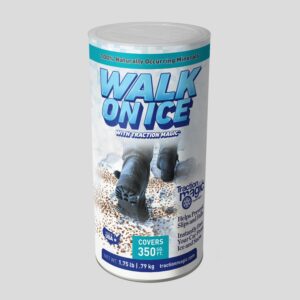
Walk On Ice
The slip and fall prevention solution, for any icy or snowy surface, on a handy portable package! Lightly spread around your walkway, driveway, vehicle, tires, and pathways. Turn ANY icy surface instantly, into a non-skid, slip-free surface.
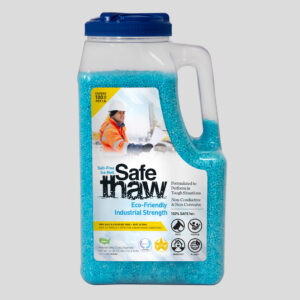
Safe Thaw
Safe Thaw was created as the ice management solution for tough winter environments. Ideal in commercial and industrial properties, shops, government agencies, bridges, construction.
